A majority of Americans, 59 percent, believe science often conflicts with religion, while 38 percent say the two areas are mostly compatible
The most religious Americans are less likely to believe that religion and science conflict with each other, a new Pew Research poll finds.
People with no particular religious affiliation, or who are not religiously observant, are most inclined to think religion and science generally clash.
One of the biggest areas of contention involves how humans came to be. Two-thirds of Americans — 65 percent — say humans evolved over time.
Some see a contradiction between the Theory of Evolution — which holds that humans evolved from other animals over time — and core tenets of the Christian faith, particularly the belief that a supreme being created life and the Universe.
The debate over evolution and whether it should be taught to American schoolchildren was so heated that it eventually reached the U.S. Supreme Court — the highest court in the United States.
In 1925, the southern state of Tennessee passed a bill banning the teaching of evolution at all of the state’s educational institutions. John Scopes, a high school science teacher in the state, challenged the law by teaching evolution to his students. He was arrested and convicted, only to have his conviction overturned by the state supreme court. The law was never enforced in Tennessee again.
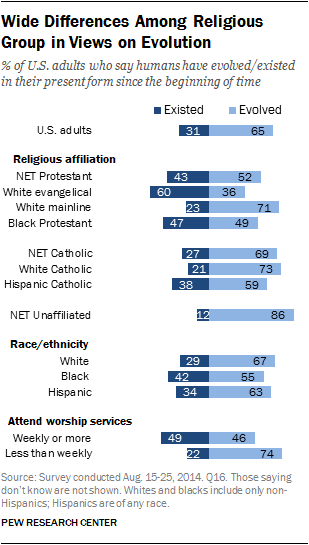 The issue finally reached the U.S. Supreme Court 40 years later, after Susan Epperson, a Zoology teacher in Arkansas, challenged a state law that banned teaching students that “mankind ascended or descended from a lower order of animals.” In 1968, the Supreme Court, unanimously declared the Arkansas law unconstitutional.
The issue finally reached the U.S. Supreme Court 40 years later, after Susan Epperson, a Zoology teacher in Arkansas, challenged a state law that banned teaching students that “mankind ascended or descended from a lower order of animals.” In 1968, the Supreme Court, unanimously declared the Arkansas law unconstitutional.
Today, according to the Pew poll, about 1 in 3 Americans — 31 percent — think humans did not evolve and have always existed in their present form. White evangelical Protestants — 60 percent of them — are more likely than people in other major religious groups to believe this view.
However, 1 in 4 Americans — 24 percent — seems to believe in something of a gray area between evolution and creationism, saying human evolution occurred with the guidance of “a supreme being.”
That’s in keeping with a 2014 survey that studied the public’s beliefs about human origins in depth and found there were people who ascribed to a sort of theistic evolutionism — the belief that God or a divine intelligence was somehow behind evolution.
“I was surprised at the level of sort of disarray over these beliefs,” said Jonathan Hill, assistant professor of Sociology at Calvin College, who conducted the study. “Their views are rather fragmented, so yes, they could affirm an Adam and Eve and at the same time affirm evolution…the real world and beliefs that people hold on this are very messy.”
Hill found that the more he drilled down and asked people about their views on creationism in greater detail, the less certain people were about historical claims in the bible.
“It tells me there are elites in society who are invested in one narrative or another,” Hill said. “They’re very articulate and they have a lot to gain, one way or another, about a particular narrative about human origins, but it does say that a large swathe of the public isn’t on board with either of those programs.”

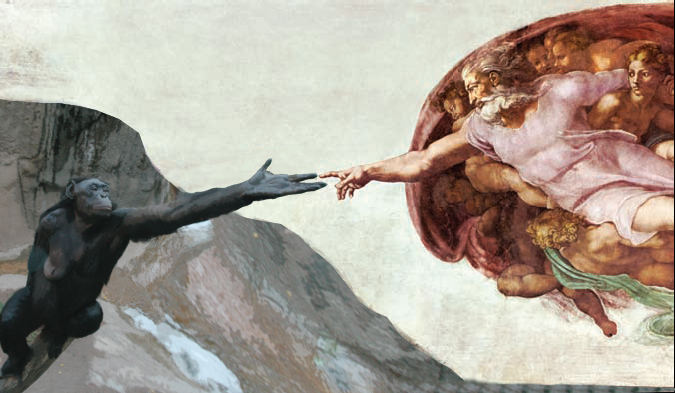










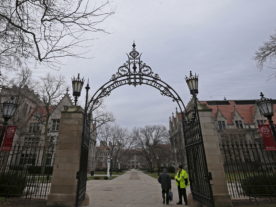

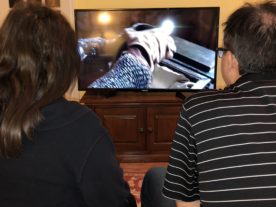







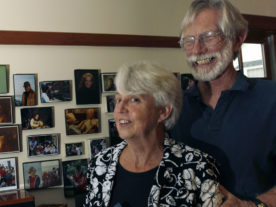


When the popular sentiment was that we were aboard a flat earth in a geo-centric universe, it still did not make it so.
It follows then, that public opinion in matters of truth mean nothing in comparison to the actual truth itself.
Until such time as the devout can make a compelling case for their claims of the supernatural, their deistic/theistic fantasies warrant no credence whatsoever…
-jjg
pLEASE READ Genesis C
Genesis is mythology at best.
Belief is personal and not science in any sense.
l am a chemist and read physics and chemistry every day.
My love of science was inspired by a high school biology teacher and has been life long..
I am a christian and love the Lord.
I also read the Bible every day.
I have few conflicts and truly enjoy both as well as literature such as Charles Dickens and Zen Philosophy,
Once evolution progressed into an intelligent being. Creation jumped into the mix by creating a myth, and charging for believing in that myth. The Physically and Mentally lazy will always believe in the creation aspect of life. Why? Because, it takes no mental/physical ability to believe in it. All they want is someone to lead them in a direction of continual life. Creation teaches that you never really die. But, you cannot and will not be considered to have everlasting life, if you don’t contribute at least 20% of your income. Trust me, this is the minimum and you will be forced to give it, if you want to be a real member of a church. And, this is just the beginning. Many clergy, demand that you provide a family member for their personal use. And, many parishioners grant them this. I could go on and on but, you must witness for yourselves.
There is one simple word that you are missing “Faith” You have to know what faith means
I’m a child of God, created on His own image by Him.
You can believe whatever make you happy
That is just make believe
This is a ridiculous notion, that creationists are mentally lazy. Was Thomas Aquinas lazy when he wrote the ‘Summa Theologica’? St. Augustine when he wrote ‘City of God?’ Evolutionists may have their proponents, but they must never claim that the other side is ‘lazy.’ What is lazy is much of the writing that passes for ‘truth’ in scientific journals that is completely incomprehensible to the so-called ‘layman reader.’ Much of that is lazy academic writing that doesn’t take into account the need to explain scientific concepts to a reasonably educated person. Such academic writing is jargon and completely recondite.
If there is a god and he wants me to believe in him, he will show me in a way that he knows I will understand. He won’t send some guy in a robe and a hat spouting mumbo jumbo and telling me fairytales from a book. Until then, I will continue to try to figure it out myself from what is seen and pieced together by our science. I’m among the 10% of Americans who is not a believer in anything supernatural and has no spiritual feelings.
Where is the conflict? Is it between science and religion or between evolution and religion? Also what religions since in today’s world there are about 12 religions ranging from Judaism to Christianity to Scientology. In a scientific point of view there is no conflict between science and religion based on a Supreme Being creating life and the universe since the conflict is between a strict interpretation of the Bible and science which Einstein pointed out in a 1939 article. In my case I have a PhD in a biological science and I am a practicing Catholic and I have never experienced a conflict between science and my religious beliefs. If anything an examination of the Periodic Chart of the Elements illustrates a rational gradation from one element to another which implies an intelligent design to the Fermi Paradox that the Sun is a typical star and with billions of stars in the galaxy that would give a high probability of Earth-like planets that would allow intelligent life to develop that would have developed interstellar travel. Therefore Earth should have been visited by now, yet there is no convincing evidence that this has occurred causing Enrico Fermi the renowned physicist to ask “Where is everybody?” The Fermi Paradox raises the question that did a Supreme Being create only one world and one mankind and if so why?
The difference between science and religion is that religious dogma asserts an absolute truth that never changes. The major religions of the world were invented shortly after the discovery of fire and the invention of the wheel by primitives who knew just about nothing. Religion’s problem is reconciling its unshakable dogma with demonstrable scientific facts which contradict it. For the Catholic Church this started with Galileo who was put under house arrest and shown the instruments of torture for his heretical assertion that the earth was not the center of the universe. This could be seen by anyone with a telescope observing that the moons of Jupiter rotated around Jupiter, not the earth. That geocentric doctrine was very convenient for Catholicism because it was consistent with their theology that God’s purpose for creating everything was the creation of man. Religion has been fighting a rear guard retreat in the face of science ever since. What will they do when it becomes possible to create life and eventually human life out of inert matter? Science is on the threshold. Science does not offer absolute truths the way religion does. It can only offer theories, explanations that are not inconsistent with observed facts. When an inconsistency arises that cannot be explained, science’s reaction is to throw up its hand and say “we don’t know” when it doesn’t have an alternative theory. Right now such a problem exists with dark matter and dark energy. Scientists know they exist, they just have no way to explain it. How does religion explain it? It doesn’t. Primitives couldn’t possibly have conceived such notions and so they throw everything in the same bag that is called “it’s God’s will.”
This disconnect between science and religion can be easily explained by two words: belief and knowledge. Those who dismiss or feel uncomfortable with aspects of science do so on the basis of belief, not knowledge.
I am in the 24% that believes in some guidance.
I often ask the question, is a miracle, any less of a miracle, if it can be explained?
Take the California drought, is it less of a miracle that an el nino is coming just when we need it most? Science can explain how things happen and predict what will happen, but science still lacks compassion humans seek. It’s not a bad thing to know you have a 50% chance of getting cancer again, but its a miracle that you don’t.
I think it is hypocritical to put limits on gods power and say i have faith in god.
Most people have been brainwashed as children to believe in god. Brainwashing works. I feel most fortunate that my parents allowed me to discover the world for myself and draw my own conclusions. Those conclusions often horrified them but there was little they could do about it. I was made aware of the religious beliefs in the history of my family and participated in their rites and rituals but they meant nothing to me. I consider religion a burden, a handicap, a vulnerability to those who would exercise power over others through fear and unprovable promises, and a significant cause of crimes and wars. Personally I condemn all religion as hogwash. My motto in life, neither a follower nor a leader be. No cleric can constrain me, I simply won’t allow it which leaves them powerless over me.
Science is atheist. Of course they fighting religion.
Astronomy, physic, biology is their favorite weapons.
Evolution is mambo jambo..
And this is from Indonesia..